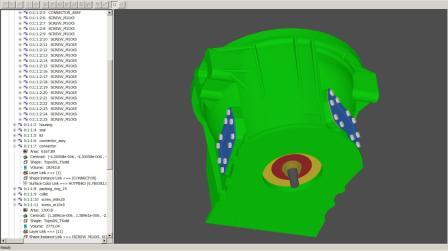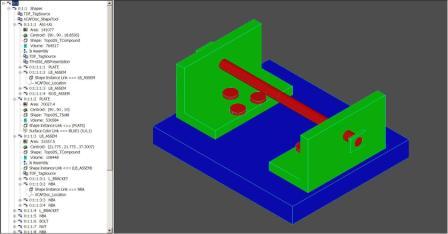- Join our Team
- Resources
-
Account
- Cart
- EN FR
Datakit announces the release of a read/write library for Step

June 01, 07
Datakit designs its libraries for software companies seeking to go beyond mere file-to-file transfer with sophisticated capability for processing data attributes. The new release is true to this principle, and converts all entities one by one. Unlike solutions using DLL calls, the libraries eliminate intermediary files and are fully integrated into the vendor's software.
Samad Elboustini, technical manager at Datakit, comments: "most vendors initially intend to integrate our technology via DLLs and that is how they test the robustness and capacity of our solutions, but as soon as they want functions to do things that are specific to their software, they realise the full advantage of using our libraries".
It was in response to vendor demand that Datakit set out to develop a library capable of reading and writing STEP. What makes STEP so valuable is its ability to act as a neutral medium for describing relevant product information and the different stages in a product life cycle. The key criteria are its portability between platforms and operating systems, its interoperability, the lifetime of archived data, its upgradability, supporting technical innovations without existing data having to be reconverted for transcoding purposes, and its modularity, enabling the different categories of data that occur in product life cycles to be exchanged.
Though the IGES neutral format has been extended to describe model topology, STEP was, from the outset organised to do this. From a structural viewpoint it already has all the resources needed to link together the geometry and manage the assemblies, PMI or FD&T and features. The value and advantages are well known. However, it will be some time yet before the use of all this data is widely adopted. Nonetheless, the trend is under way: FD&T and associative annotations are now being used, and we have feature description, but this is still relatively unused… Datakit is a precursor here through its involvement in the work of CAX-IF (Forum dedicated to improving the quality of STEP data exchange) and decision to explore this direction.
The new library provides a perfect answer to industry demands and will be easy to develop. Christian Caillet, a STEP specialist, explains: "the library enables topologically accurate models to be read and written to produce solids. It is also naturally well adapted to the concept of PLM. Its structure, enabling each element to be identified, makes it possible to find the data and easily produce bills of materials."
Francis Cadin, Datakit CEO, concludes: "the development of concurrent engineering and PLM are the reasons why we have gone down the STEP road.
Though it is a complete format, it is also complex and this caused us to hesitate for a long time before we decided to develop this library. Having STEP specialists in our team was a key asset. Now that we have STEP under our belt we are looking at other projects for neutral libraries."
